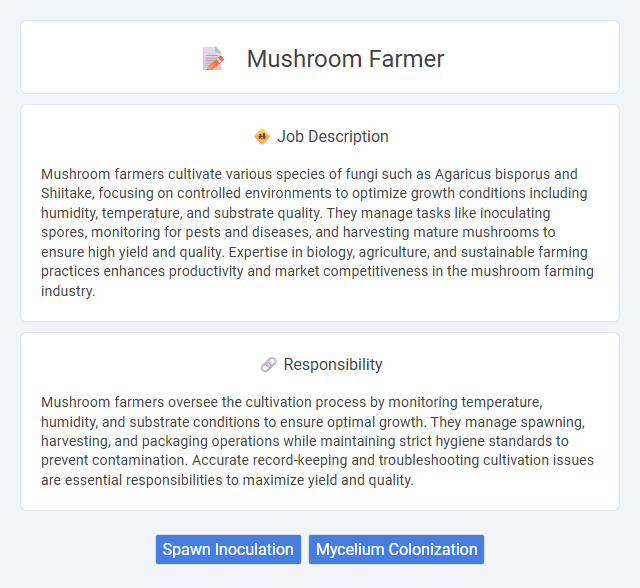
Mushroom farmers cultivate various species of fungi such as Agaricus bisporus and Shiitake, focusing on controlled environments to optimize growth conditions including humidity, temperature, and substrate quality. They manage tasks like inoculating spores, monitoring for pests and diseases, and harvesting mature mushrooms to ensure high yield and quality. Expertise in biology, agriculture, and sustainable farming practices enhances productivity and market competitiveness in the mushroom farming industry.
Working as a mushroom farmer may suit individuals who are physically fit and able to work in damp, dimly lit environments for extended periods. Those comfortable with repetitive tasks and possessing patience might find the job rewarding, but people sensitive to mold or allergens could experience challenges. It is probable that candidates with strong attention to detail and an interest in agricultural processes will adapt better to the demands of mushroom cultivation.
Qualification
Mushroom farmers require knowledge in agriculture, biology, and environmental science to optimize fungal growth conditions. Practical experience with cultivating techniques, pest management, and harvesting is essential for maintaining high yield and quality. Certification in organic farming or agricultural management enhances employment prospects in the mushroom farming industry.
Responsibility
Mushroom farmers oversee the cultivation process by monitoring temperature, humidity, and substrate conditions to ensure optimal growth. They manage spawning, harvesting, and packaging operations while maintaining strict hygiene standards to prevent contamination. Accurate record-keeping and troubleshooting cultivation issues are essential responsibilities to maximize yield and quality.
Benefit
Mushroom farming likely offers health benefits due to working with natural, organic materials that can enhance well-being. The job probably provides steady income potential, especially with the growing demand for mushrooms in culinary and medicinal markets. Workers might also enjoy flexible schedules and opportunities for skill development in sustainable agriculture.
Challenge
Mushroom farming likely involves challenges related to maintaining precise environmental conditions such as humidity, temperature, and light, which are crucial for optimal growth. There is a probability of facing difficulties in managing pests and diseases that can quickly spread in the enclosed growing areas. Consistent monitoring and timely intervention probably play important roles in overcoming these challenges to ensure a successful harvest.
Career Advancement
Mushroom farmers can advance their careers by gaining expertise in mycology and adopting sustainable cultivation technologies, which increase yield efficiency and market value. Pursuing certifications in agricultural management or agronomy enhances their credentials for supervisory or consultancy roles within the agricultural sector. Opportunities also exist to transition into research and development or agribusiness management, where strategic planning and innovation drive industry growth.
Key Terms
Spawn Inoculation
Spawn inoculation is a critical step in mushroom farming involving the introduction of mushroom spores or mycelium into a substrate such as straw or sawdust, ensuring optimal growth conditions. Mushroom farmers must maintain sterile environments to prevent contamination during inoculation, using specialized tools and techniques to spread spawn evenly. Mastery of spawn inoculation directly impacts yield quality, making it a vital skill for successful mushroom production.
Mycelium Colonization
Mushroom farmers play a crucial role in overseeing mycelium colonization, a vital stage where fungal hyphae penetrate and colonize the substrate to ensure healthy mushroom growth. They carefully monitor environmental factors such as temperature, humidity, and CO2 levels to optimize colonization speed and prevent contamination. Successful mycelium colonization directly impacts yield and quality, making it a key focus for experienced mushroom cultivation professionals.
 kuljobs.com
kuljobs.com